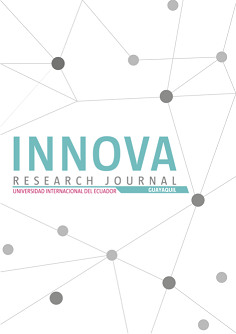La Cultura ambiental desde la participación ciudadana para el desarrollo de la conciencia crítica en la ciudadanía Lojana
Main Article Content
Abstract
This article proposes an alternative on how to improve the environmental culture in people in order to obtain and live in a healthy environment. An essential element is to achieve in the social actors the development of their critical conscience so that the impacts of man on the environment diminish, to ensure the improvement of an environmental culture that provides the knowledge, skills and values necessary for personal and social transformation. The general objective of the research was to achieve the formation of an environmental culture in the "Gran Colombia" wholesale market merchants in Loja-Ecuador, through the integral management of solid waste generated in the area. The proposal was conceived from the methodology of research-action-participation, which is an effective way to guarantee the empowerment of processes of critical awareness development, active participation of those involved in the determination and solution of the problem and the elaboration of social projects initiatives that lead from the formation of an environmental culture to mitigate the environmental impacts from the leadership of citizenship. The evaluation of the results of the intervention project to contribute to the formation of the environmental culture of the merchants, allowed the development of critical awareness of merchants about the problems of their environment, specifically the problem of poor solid waste management. From this perspective of research-action-participation, favorable changes were evidenced in terms of critical awareness, and the willingness to participate in tasks to solve current problems and prevent contamination of the sectors surrounding the market and environmental culture of the merchants to solve this deterioration is appreciated. Through this program, projects are established aimed at: recycling, bond application, environmental education based on the management and use of solid waste, selective storage, installation of a collection center and finally the promotion of the formation of an organization that exercise the use of solid waste.
Downloads
Article Details
COPYRIGHT NOTICE
Authors who publish in the INNOVA Research Journal keeps copyright and guarantee the journal the right to be the first publication of the work under the Creative Commons License, Attribution-Non-Commercial 4.0 International (CC BY-NC 4.0). They can be copied, used, disseminated, transmitted and publicly exhibited, provided that: a) the authorship and original source of their publication (magazine, publisher, URL and DOI of the work) is cited; b) are not used for commercial purposes; c) the existence and specifications of this license of use are mentioned.
References
Arboleda, I. F. M., & Páramo, P. (2014). La investigación en educación ambiental en América Latina: un análisis bibliométrico. Revista Colombiana de educación, (66), 55-72.
Balcázar, F. E. (2003). Investigación acción participativa (iap): Aspectos conceptuales y dificultades de implementación. Fundamentos en humanidades, 4(7-8), 59-77.
Boff L. (2004). Saber cuidar: ética de lo humano, complejidad de la vida para la vida, 11. Ed. Petrópolis-RJ. Editora Vozes. 88 pp.
Castillo, R. M. (2010). La importancia de la educación ambiental ante la problemática actual. Revista Electrónica Educare, 14(1), 97-111.
Duque Pérez, F. A. (2011). La educación ambiental para la conservación del agua en el Consejo Popular de Jibacoa (Doctoral dissertation, Universidad Central “Marta Abreu” de Las Villas).
Escudero, J. M., & Martínez, B. (2011). Educación inclusiva y cambio escolar. Revista iberoamericana de educación, 55, 85-105.
Frabboni, S., Gazzadi, G. C., & Spessot, A. (2007). TEM study of annealed Pt nanostructures grown by electron beam-induced deposition. Physica E: Low-dimensional Systems and Nanostructures,37(1-2), 265-269.
Gaudiano, E. G. (2000). Complejidad en Educación Ambiental.Tópicos en educación ambiental, 2 (4), 21-32.
Guerrero, E. M., Wagner, L. S., Rodríguez, C. I., & Sosa, B. S. (2015). Acciones colectivas y recursos naturales en conflicto. Historia ambiental de luchas urbanas por agua y sierras en Tandil, Argentina. Revista Luna Azul, (41).
González‐Gaudiano, E. (2007). Schooling and environment in Latin America in the third millennium. Environmental Education Research, 13(2), 155-169.
Maass, J. M., Balvanera, P., Castillo, A., Daily, G. C., Mooney, H. A., Ehrlich, P. ...& Martínez-Yrizar, A. (2005). Ecosystem services of tropical dry forests: insights from long-term ecological and social research on the Pacific Coast of Mexico. Ecology and society, 10(1).
Molina, J. F.,& Tarí, J. J. (2007). Environmental management and firm performance: A case study. Journal of environmental Management, 84(4), 606-619.
Mora, S., & Escanero-Marcén, J. F. (2013). Análisis del ambiente educacional tras la implantación del Plan de Bolonia en la Facultad de Medicina de la Universidad de Zaragoza, España: comparación con la Facultad de Medicina de la Universidad de Chile. FEM: Revista de la Fundación Educación Médica,16(3), 167-179.
Meira Cartea, P. Á. (2013). Problemas ambientales globales y educación ambiental: Una aproximación desde las representaciones sociales del cambio climático¹. Revista Integra Educativa, 6(3), 29-64.
Novo, M. (2009). La educación ambiental, una genuina educación para el desarrollo sostenible Environmental Education, agenuine education for sustainable development. Revista de educación, 195-217.
PNUMA, Loja, M. de, & Internacional, N. y C. (2007). Perspectivas del Medio Ambiente Urbano: GEO Loja. Loja. Retrieved from http://www.naturalezaycultura.org/docs/Geo Loja.pdf.
Pintado Astudillo, M. (2011). Elaboración de una guía para el manejo de los desechos sólidos de Rioverde, año 2011.
Torres Ibarra, L. T., & Villalta Zelaya, Y. V. (2009). Eficacia de la protección de los recursos hídricos, como un mecanismo para garantizar el derecho humano al agua, en el Departamento de San Salvador (Doctoral dissertation, Universidad de El Salvador).
Zubieta, E. M., & Delfino, G. (2010). Satisfacción con la vida, bienestar psicológico y bienestar social en estudiantes universitarios de Buenos Aires. Anuario de investigaciones, 17, 277-283.






